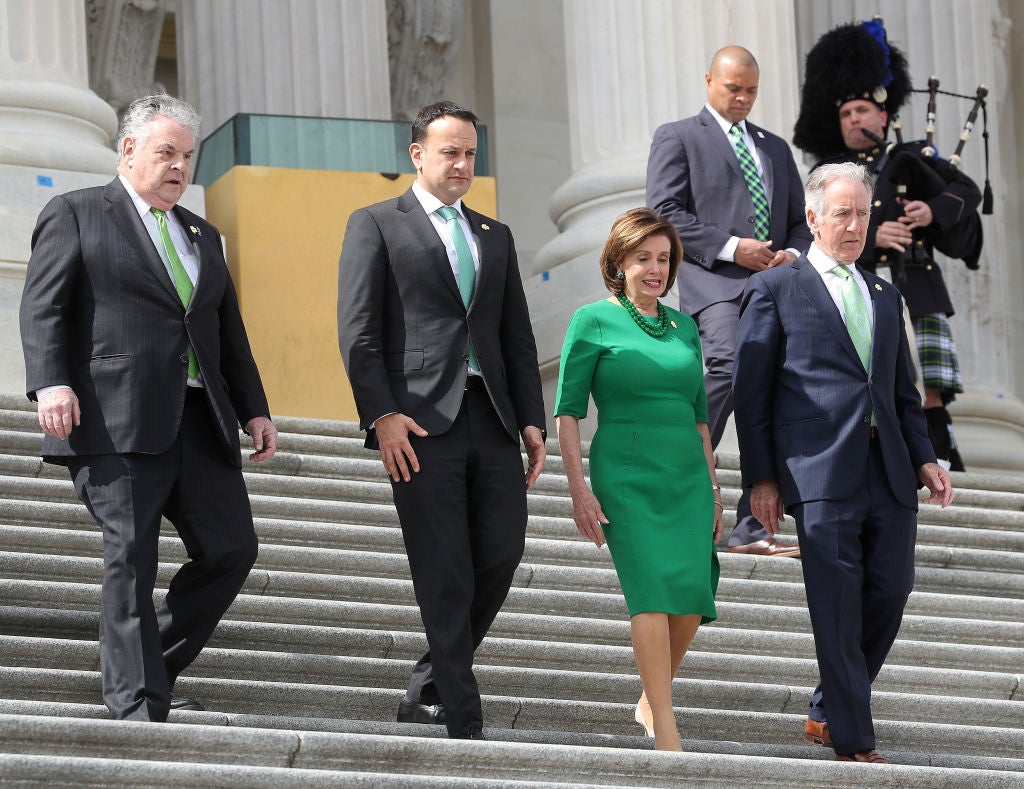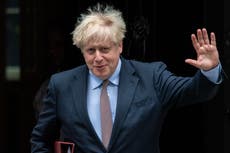Brexit: Three things to look for as Washington pressures Boris Johnson to back down from Ireland proposal
While Democrats have issued warnings of their own to Johnson, Republicans have been far more circumspect, writes US political correspondent Griffin Connolly


As Prime Minister Boris Johnson continues to threaten closing the border between the province of Northern Ireland and the Republic of Ireland amid Brexit negotiations with the EU, American lawmakers have re-traced a longstanding red line of their own: If the UK closes the Irish border in violation of the Good Friday Agreement, there will be no US-UK trade deal.
The 1998 accords that marked the end of the Troubles, demilitarised the Irish border, and allowed for the free flow of commerce across it has enjoyed bipartisan support in the US since its signing.
While that continues to be the case 22 years later, Democrats and Republicans reacted quite differently to Downing Street's proposed "Internal Market Bill," which would unilaterally amend the withdrawal agreement it signed with the EU last year to harden the Irish border.
Here are three key takeaways from the varied US responses to Mr Johnson's controversial maneuvre and its implications on a potential US-UK trade agreement.
1. Republicans are calling BoJo’s bluff
Leading House Republicans with jurisdiction over international trade agreements have made it clear they do not take Mr Johnson's threat of hardening the Irish border as seriously as their Democratic counterparts.
That, or they’re doing everything in their power to prevent stoking any unnecessary acrimony between Washington and London ahead of expected negotiations for a landmark bilateral trade deal.
"I don't want to create imaginary issues where there aren't any," Congressman Kevin Brady, Republican of Texas, told reporters on Thursday when asked about how the UK bill — which has sent shockwaves through Europe — would affect US-UK trade negotiations.
Both the US and the UK, with the largest and sixth-largest economies in the world, respectively, are keen to strike a deal that protects their own workers but keeps their immense buying markets open for each other.
One of the key selling points of Mr Johnson's Brexit campaign in 2016 was that leaving the EU would allow the UK to negotiate fairer trade agreements tailored to its own political and industrial realities — and not the realities of, say, Spain, Ukraine, or Poland.
Mr Brady acknowledged that the trading relationship between the US and the UK with regard to Northern Ireland "has always been one of the more sensitive parts of these agreements," but he didn't denounce Mr Johnson's bill threatening to completely upend the 22-year history of the open Irish border, a step from the UK that would defy the bipartisan position of Congress.
Instead, the Texas Republican reserved his condemnation for Speaker Nancy Pelosi for condemning Downing Street's proposal and re-drawing the red line that Congress would torpedo any trade deal with the UK if it hardens the Irish border.
"I worry more about the speaker undermining the president's efforts to expand trade, whether it's to the UK or to Kenya or the other countries," Mr Brady said.
But he remains "confident" the parties — Democrats, Republicans, the UK and Ireland — will reach a solution.
2. Democrats rattle their sabres
Ms Pelosi and House Democrats are not so trusting of Mr Johnson’s ultimate intentions as their Republican counterparts seem to be.
They responded to Mr Johnson's threats to unilaterally scrap the January withdrawal treaty with threats of their own.
"It's a very simple message. They know it. They've heard it ... This is not anything we've hidden under a bush: There will be no bilateral US-UK agreement if ... the Good Friday accords with regard to the border are changed," the speaker said on Thursday.
The speaker echoed comments from other House Democrats this week that the UK is free to decide its geopolitical fate in terms of pulling back from the European Union. But if the country goes about that process in a way that upsets existing agreements involving the US, which is a guarantor of the Good Friday Agreement, then the US could not trust it to enter into good-faith negotiations on a trade bilateral trade deal.
"Their self determination is up to them. Our trade relations are up to us," Ms Pelosi said.
"It is not up to them to think that they will be rewarded if they mess with the Good Friday accords," she said.
House Foreign Affairs Chairman Eliot Engel has outlined Washington's motivations for applying pressure on the UK to stay true to January's EU withdrawal agreement with respect to keeping the border open on the island.
American leaders fear that closing the border between Northern Ireland and the Republic of Ireland would incite a return to Republican and Loyalist violence that ended in the late-1990s.
Such a scenario could lead to the remilitarisation of that border and chaos surrounding the political future of Northern Ireland, a destabilising effect that would likely spawn humanitarian concerns, upset markets and cause several other strategic headaches for leaders in Washington.
"I urge Prime Minister Johnson to abide by the legally binding agreements the United Kingdom agreed to and I call on the UK and the EU to continue to negotiate in good faith to seek out a smooth Brexit transition come October 15th," Mr Engel has said in a statement to The Independent.
3. Trump v Biden
A spokesman for Donald Trump's national security council declined to comment for this story, but the White House has repeatedly insisted throughout the Brexit process that it sees eye-to-eye with congressional Democrats about the imperative to protect the fragile peace in Ireland.
The administration reaffirmed that commitment most recently at a House Ways and Means Committee hearing on 17 June, when Democratic Congressman John Larson of Connecticut asked US Trade Ambassador Robert Lighthizer about upholding the Good Friday agreement as a prerequisite for a US-UK trade deal.
"I completely agree with your position. ... I know the president agrees with it also," Mr Lighthizer said.
"If we put up borders, the agreement won't pass the Congress, so there won't be much point in negotiating it. I've made that quite clear. [Chairman Richard Neal] has made it quite clear to me. The president agrees this is not something on which we're going to have a negotiation," Mr Lighthizer said.
But the administration's silence on the UK government's controversial manoeuvre this week demonstrates how unwilling Mr Trump is to publicly antagonise a potential trading partner in Mr Johnson.
The president has sold himself to American voters as the consummate dealmaker. He constantly touts the bipartisan US-Mexico-Canada Act (USMCA) he signed into law last December as proof of his negotiating chops. And if Mr Trump's eagerness to take in-person meetings in 2018 with North Korean leader Kim Jong Un were any indication, he's more than comfortable brushing off rhetorical bluster to maintain the friendly relations that are essential to international dealmaking.
Advisers to Democratic presidential nominee Joe Biden, on the other hand, have left no ambiguity about his feelings this week for Mr Johnson's proposal to commercially separate Northern Ireland from Ireland.
If Mr Johnson follows through with its internal market bill and Mr Biden is president in January, there will be no US-UK trade deal.
"[Joe Biden] is committed to preserving the hard-earned peace & stability in Northern Ireland," the former vice president's foreign affairs adviser, Antony Blinken, tweeted last week. "As the UK and EU work out their relationship, any arrangements must protect the Good Friday Agreement and prevent the return of a hard border," Mr Blinken wrote.
Mr Biden, who has Irish heritage, has often spoken fondly of the island.
He has described his 2016 visit to County Mayo, on the island's northwest coast, as a "homecoming."
Join our commenting forum
Join thought-provoking conversations, follow other Independent readers and see their replies
Comments




Bookmark popover
Removed from bookmarks